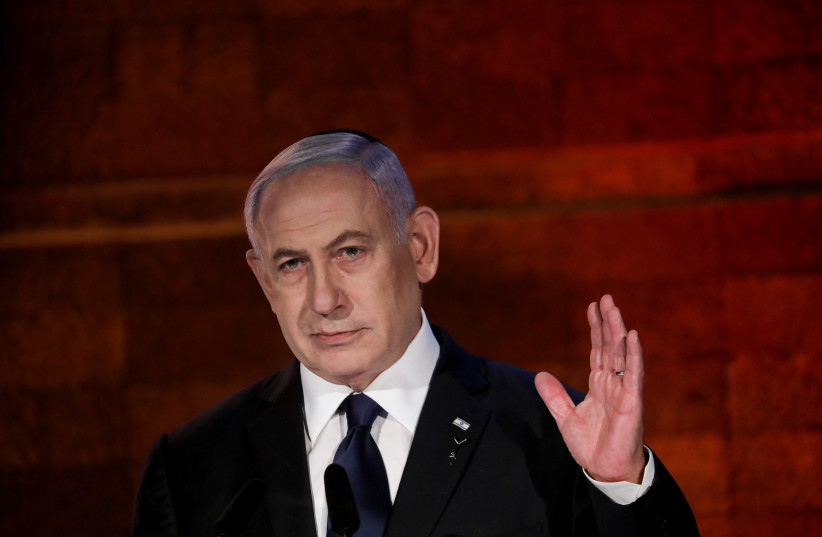Aaron David Miller and Daniel C. Kurtzer failed to facilitate peace in their 50-plus-year careers as senior Middle East diplomats. This did not prevent them from preaching unwarranted warnings, spreading slander and inciting against Israel’s incoming government in the recent Washington Post article, “Biden should respond boldly to a radical Netanyahu government.”
Their failure to bring peace stems from their adherence to what Benjamin Netanyahu refers to in his recently published autobiography as the “Palestinian Centrality Theory” – the belief that the conflict between Israel and the Palestinians, who constitute less than 2% of the Arab world, is the core of all conflicts in the Middle East.
That longtime premise was proven wrong.
Millions of Muslims in the region have been killed by other Muslims and it had nothing to do with the Jewish state. The threat to peace and stability in the Middle East is not from Israel and its incoming government – but from radical Iran and the tyrants in Tehran. Without derogation of the Palestinian issues, responsible leaders in Riyadh and other regional capitals understand that much better than the pundits of Bethesda.
Over the years, those “experts” refused to believe that Palestinian boycotts and violations of peace agreements were rooted in a refusal to genuinely recognize Israel. Instead, they argued that Palestinian grievances were rooted in the expansion of Jewish communities in Judea and Jerusalem. They even believed that conflict and sectarianism in Syria were rooted in Israel’s presence on the Golan Heights.

The slaughter of nearly a million Syrians in the recent civil war and Iran’s intrusion into Israel’s northern neighbors disprove that falsehood.
During the distinguished diplomats’ tenures, interfering with Israel’s politics was a norm. Bill Clinton campaigned for Shimon Peres in 1996, and Barack Obama did everything in his power to bring down Netanyahu in 2015. In both cases, the meddling boomeranged. It backfired in the recent elections too.
The Washington Post op-ed writers are not alone. In a similar fashion, The New York Times published an editorial, “The ideal of democracy in a Jewish state is in jeopardy,” sounding the same alarms. Like the Post, the Times and its stellar columnist Thomas Friedman have been constantly critical of Netanyahu.
In 2010, a Friedman opinion piece, “I believe I can fly,” chided Netanyahu’s peace policy and compared him to a madman who jumps off the 80th floor of a building, convinced he is flying for 79 floors until he gets splattered. On a different occasion, Friedman compared Netanyahu to a drunken driver. When policies fail, the weak pivot to personal attacks.
Luckily for Israel and peace, Netanyahu didn’t crash, and fortunately for Friedman his job description doesn’t entail accountability.
PEEL AWAY the untruths that hide their position, these Bibi-bashers are not defending democracy, US-Israel relations, or peace. Instead, they are working to circumvent the verdict of the Israeli public for the sake of failed policies of the past.
For decades, these opinion writers propagated the notion that peace with the Palestinians was a prerequisite for peace in the Middle East, that Tehran was trustworthy, and that far-fetched Israeli concessions were the key to bringing peace.
Netanyahu, who dared to think differently, helped bring peace with four Arab countries in 2020. After years of persuasion and clandestine meetings, the breakthrough was made possible within four months once the United Arab Emirates, Bahrain, Morocco, Sudan and most importantly the American administration, were convinced to abandon failed policies and focus on true national interests.
The moderate and realistic peace-seeking majority in the region is now giving peace-for-peace a chance. The results have surpassed expectations. Thousands of Israeli and Emirati businessmen and tourists have already visited each other’s countries. Notably, Saudi Arabia allows those travelers to fly over its shortest route airspace.
UAE and Israeli tourists have witnessed the wonders of each other’s lands, and billions in trade between businesses have already been transacted. This will facilitate accessibility to drinking water, advance agriculture, and bring accessible medical care and life-improving technology to millions in the region and elsewhere. Who knows – one day a high-speed train may connect commuters from Oman and Riyadh to Tel Aviv and Jerusalem.
IN RECENT years, American officials and politicians have alerted the public about attempts by foreign powers, such as China and Russia, to interfere and disrupt the course of elections in America. The concern about assuring the uninterrupted democratic process is real and the danger should be confronted head on. And yet it seems that for Friedman, Miller, Kurtzer and others in these establishment circles, meddling in Israel’s elections is condoned and even applauded.
Israel’s incoming government enjoys a solid majority with a strong mandate to govern and implement its policies for peace, security and prosperity for Israel and the region. The cohorts of liberal commentators, diplomats and academic scholars, and particularly those in the American Jewish community who support Israel, should be the first to support these efforts.
Disgruntled diplomats and journalists should respect Israel’s democracy and refrain from inciting against the only democracy in the region. The muck of obliviousness and slander should be overrun with unrelenting advocacy for a just peace based on historical truths.
Israel’s new government should be given a chance.
If bickering is brushed aside, and if the forces of goodwill strive for true peace-for-peace based on reality, an agreement ending the century-old Arab-Israeli conflict can soon be signed on the South Lawn.
The writer is a lawyer and holds a PhD in international relations.
